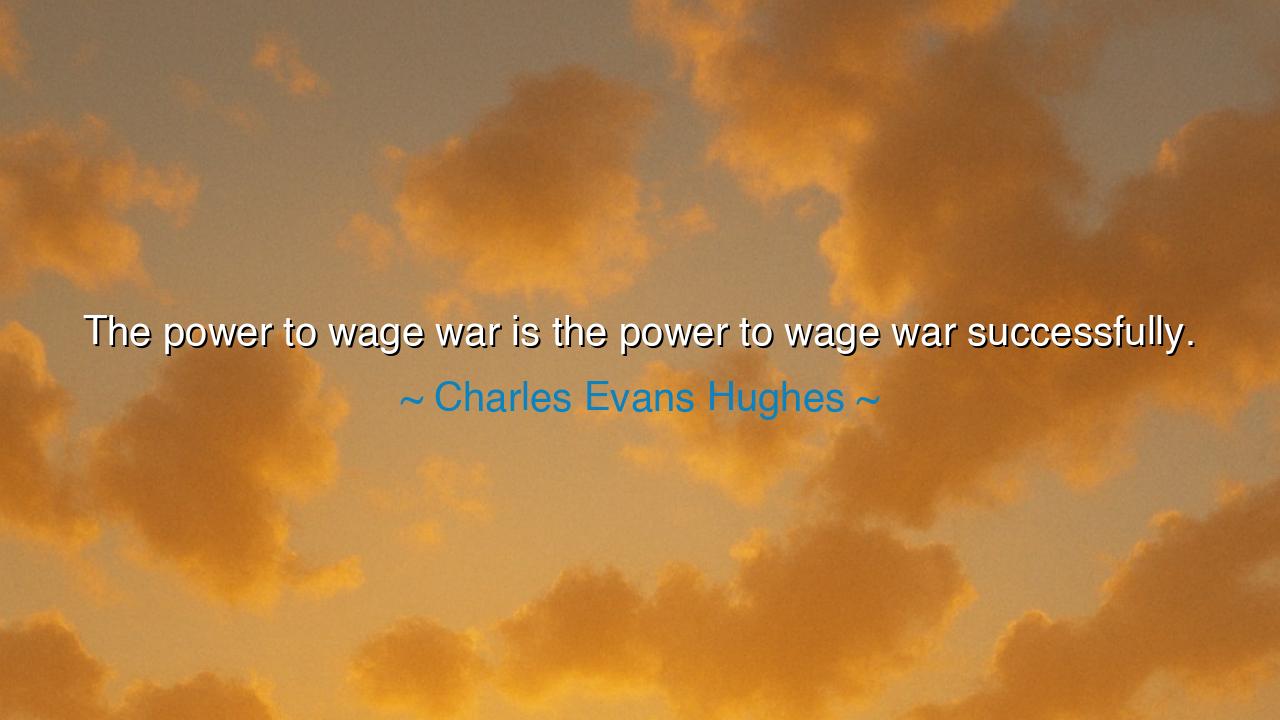
The power to wage war is the power to wage war successfully.






Charles Evans Hughes, jurist and statesman of the early twentieth century, once spoke with piercing clarity: “The power to wage war is the power to wage war successfully.” In these words lies a truth both pragmatic and sobering, for he reminds us that half-measures in conflict are but preludes to ruin. To hold the power of war is not merely to raise an army or declare hostilities; it is to sustain, to endure, to fight with the full strength required to prevail. Anything less is folly, and those who begin without the means to finish are destined to destruction.
Hughes’s wisdom came forth in the shadow of the First World War, when nations learned that modern conflict demanded not only soldiers, but industry, organization, and the will to sacrifice. In ages past, kings might send forth their knights and settle disputes in a season. But in the wars of modern times, only those who commanded immense resources — food, weapons, factories, ships, and the loyalty of millions — could hope to survive. Thus Hughes declared that the true power of war lies not in the declaration, but in the ability to pursue it to its bitter end.
History confirms his judgment. Consider Napoleon, who once strode across Europe like a colossus. He possessed brilliance, strategy, and ambition, yet when he reached into the vastness of Russia in 1812, he lacked the resources to wage that war successfully. His army froze, starved, and crumbled, and from that failure his empire collapsed. He had the power to begin war, but not the power to sustain it, and so his greatness dissolved in snow and fire. Here is the eternal lesson: to strike without strength enough to endure is to invite defeat.
Or look to the Second World War, where the United States, once reluctant to enter, unleashed the full measure of its strength after Pearl Harbor. Its factories roared with life, its farms fed not only its own but its allies, and its soldiers marched with a tide that could not be resisted. This was Hughes’s truth embodied: the power to wage war successfully — the ability not merely to fight, but to fight until victory was secured. Without such power, the Allies could not have overcome the immense fury of the Axis. With it, they prevailed, though at terrible cost.
Yet Hughes’s words also hold a warning for the ages. To possess the power to wage war successfully is to bear a grave responsibility. For the temptation will always arise to use that power, to settle disputes by force rather than by peace. A nation that arms itself mightily may forget that true greatness lies not only in the might of its armies, but in the wisdom to restrain them. Thus, Hughes’s teaching is double-edged: without sufficient power, war is ruin; with it, war may be victory, but at the risk of forgetting the higher calling of peace.
The lesson for our lives is this: do not enter any struggle, great or small, unprepared. Whether in battle, in work, or in the trials of the heart, gather the strength you need before you begin. Do not leap into conflict with only half your spirit or half your resources, for such haste leads to failure. Instead, weigh the cost, summon your courage, and only when you are prepared to endure to the end should you engage. Then, when you act, act with the fullness of your strength, as one determined to prevail.
Therefore, beloved, let Hughes’s wisdom guide you. Build your strength before you need it. Cultivate discipline, gather knowledge, foster unity, and prepare yourself for the battles of life. And above all, remember that the truest victory lies not in waging war, but in mastering the self so deeply that you may avoid unnecessary conflict altogether. For though the power to wage war successfully is essential, the highest wisdom is to wield such power in service of peace.






QAPham Quynh Anh
If success in war is linked to the power to wage it, then what happens when the consequences of war are devastating? Does this quote also imply that those who can create war are truly the most powerful? It makes me wonder if we need to rethink what true power really means—especially in a world that needs diplomacy and peace more than ever.
Ttuan
This quote seems to suggest that to win wars, you need to be able to fight them well. But what does it say about the costs of war? Can the power to wage war successfully justify the loss of human lives, resources, and long-term consequences? Is there a way to redefine success beyond mere military victory?
PPearl
Is the idea that 'waging war successfully' is an indicator of power a dangerous notion? It implies that the outcome of war defines strength, but could this lead to justifying violence as a solution to problems? In the modern world, isn’t true power better exemplified by diplomatic success, cooperation, and preventing war altogether?
SHnguyen sy hoai
Does success in war necessarily mean having the power to wage war? What if the true measure of power lies not in one's ability to fight, but in the ability to prevent conflict? Can peace be more powerful than war, and how do we define true success in the context of global power struggles? These are questions that challenge this quote's perspective on war and power.